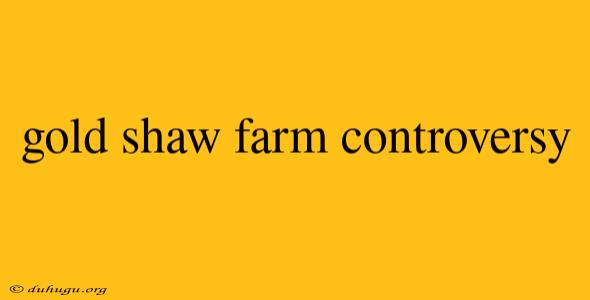Gold Shaw Farm Controversy: Uncovering the Truth
Introduction
The Gold Shaw Farm controversy has been making headlines in recent years, sparking heated debates and raising concerns among environmentalists, animal welfare advocates, and local residents. Located in the picturesque countryside of Herefordshire, England, Gold Shaw Farm has been at the center of a maelstrom of controversy surrounding its farming practices, animal welfare, and environmental impact. In this article, we will delve into the details of the controversy and explore the facts behind the furor.
The Farm's Operations
Gold Shaw Farm is a large-scale dairy farm, home to over 1,000 cows. The farm's operations are focused on producing milk for major dairy companies, including well-known brands like Tesco and Asda. The farm's owners, the Shaw family, have been farming the land for generations, with the current operation being one of the largest in the region.
Allegations of Animal Cruelty
At the heart of the controversy are allegations of animal cruelty and neglect. In 2019, an undercover investigation by animal welfare group, Animal Aid, revealed shocking footage of cows being subjected to physical abuse, neglect, and poor living conditions. The footage showed cows being kicked, punched, and hit with sticks, as well as being left in filthy and cramped conditions.
These allegations sparked widespread outrage, with many calling for the farm to be shut down and the owners to be prosecuted. An investigation by the RSPCA and the local authorities was launched, resulting in several farm workers being fired and the implementation of new animal welfare protocols.
Environmental Concerns
In addition to the animal welfare concerns, Gold Shaw Farm has also been criticized for its environmental impact. The farm's large scale of operations has led to allegations of water pollution, soil degradation, and habitat destruction. The farm's use of pesticides, fertilizers, and manure has been linked to the decline of local wildlife and the contamination of nearby waterways.
Furthermore, the farm's carbon footprint has been criticized, with many arguing that the farm's methane emissions contribute to climate change. The farm's owners have responded by stating that they are working to reduce their environmental impact, including implementing sustainable practices and reducing waste.
Local Opposition
The controversy has also sparked opposition from local residents, who have expressed concerns about the farm's impact on the local community. Many have complained about the farm's noise pollution, the smell of manure, and the traffic congestion caused by farm vehicles.
Local residents have also expressed concerns about the farm's expansion plans, which they argue will lead to further environmental degradation and quality of life issues. The local council has been urged to reject the farm's expansion plans and to prioritize the protection of the local environment.
Conclusion
The Gold Shaw Farm controversy has raised important questions about the ethics and sustainability of large-scale farming practices. While the farm's owners have taken steps to address the allegations of animal cruelty and environmental concerns, many argue that more needs to be done.
As consumers, we have the power to make informed choices about the products we buy and the companies we support. By choosing to support ethical and sustainable farming practices, we can help to create a better future for animals, the environment, and local communities.
